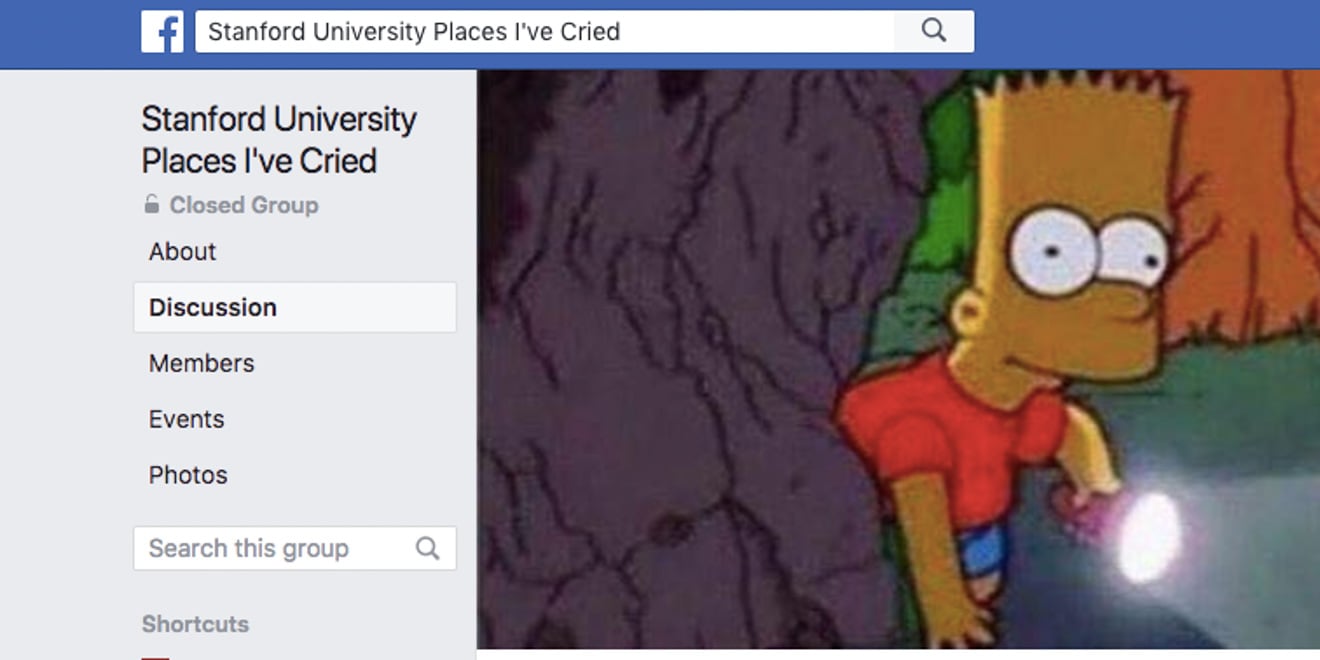“Stanford University Places I’ve Cried” (SUPIC), a closed group on Facebook that invites students to write posts about specific places where they have cried on campus, has gained over 1,000 members. Many students say that the group, created by Annie Zheng ’20, fosters a spirit of vulnerability and counters “duck syndrome culture” prevalent on campus.
Often, students choose to supplement their posts with more commentary on where they cried, and why. Posts range from, “In my bed because I’m afraid of my faculty mentors losing respect for me” to “At Lakeside [Dining], when the final straw on a bad week one was late night not having churros.”
Students recount emotional moments following bad interviews, academic crises and times when they have cried for no apparent reason.
“In all honesty, I started the group because I thought it’d be funny,” said Zheng. “But after you start the group and it gets followers, you kind of have to decide what kind of space it will be. So, initially it started because it was funny, but I also wanted it to be a place where you can combat duck syndrome.”
Duck syndrome — a colloquial term that originated at Stanford and evokes a duck that appears to smoothly glide over water but in reality paddles furiously beneath the surface — is a common metaphor for students who experience stress but feel the need to appear carefree.
Zheng says the page was inspired by the University of Illinois “UIUC Places I’ve Cried” Facebook group. The group is credited on the SUPIC page.
Self-deprecating humor is a common tool of choice on SUPIC. Carlos Ezquerro ’20 recalled using such humor when he posted, “Internally, thanks to a toxic masculinity that says that crying men have no place in society.”
“I kind of like the idea of parodying these sort of things that are going, quite possibly, wrong,” Ezquerro said. “It makes it a little easier to share when it’s in a lighthearted fashion. I think it functions in a similar way to meme pages, where you can bond over things that are kind of going wrong. I think it can be funny, but also impactful.”
Students also post in earnest. Serious messages became more frequent over winter break, Zheng noted, when some students chose to open up about challenges associated with life outside of Stanford.
“I posted on the group that one of the places that I’ve cried was on the way to the airport this winter break, after realizing that I spent a lot of my break trying to be productive rather than spending time with my family,” Edwin Carlos ’20 said.
“Over break, I thought [the posts about family] were super enlightening because I didn’t know that people had such a hard time over break,” Zheng said.
Although the group has been a space for students to become vulnerable, some see the Facebook group as a starting platform for taking greater measures for self-care and mental health as well as a reminder to reach out to peers.
“Facebook can definitely be a useful platform,” Carlos said. “It’s nice to see when my friends post on the group: It serves as a reminder that I should check in more often on people. Building that sense of community shouldn’t stay within an electronic platform.”
Zheng says that despite the openness the page has fostered with regard to bad grades, failed interviews and family issues, students still perceive some emotions as less socially acceptable and remain less inclined to open up about them.
“Stuff like jealousy, or feeling really insecure, or feeling bitter — those are also things people experience, and I think Stanford students do not like to talk about that,” she said.“So I feel like that is the deeper problem of duck syndrome.”
Even if some topics aren’t addressed, students still say that SUPIC provides a basis for emotional commonality among Stanford students.
“It gets at the idea that we all struggle,” Ezquerro said. “And it’s generally healthy and positive to be able to share that we struggle and also be able to notice that other people are feeling the same way.”
It reminds students, according to Zheng, that “it’s okay to be kind of messed up.”
Contact Karen Kurosawa at karen16 ‘at’ stanford.edu.
